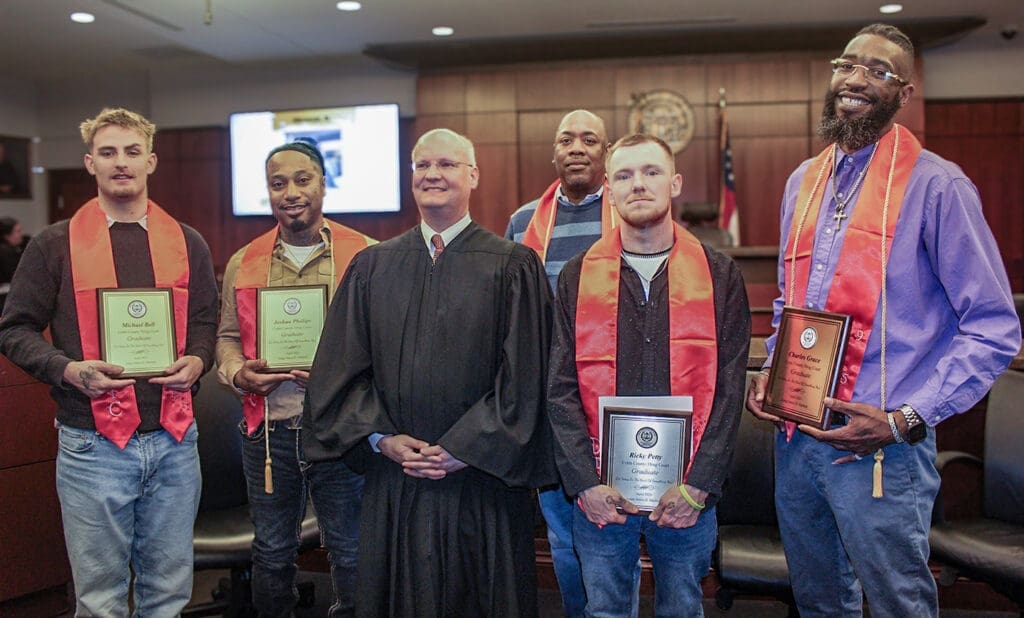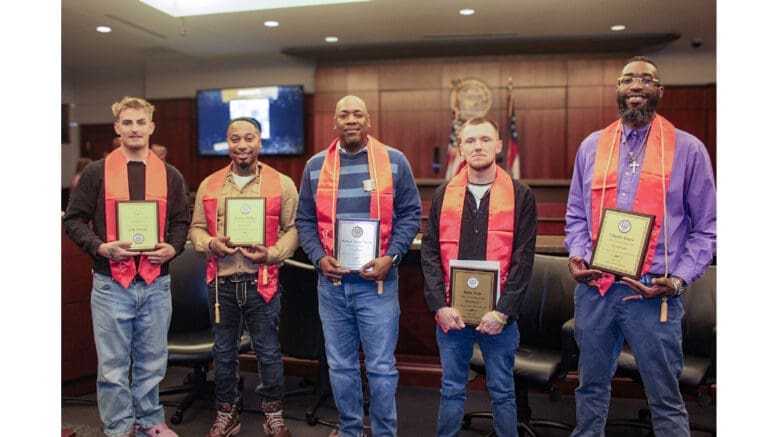The Cobb County Drug Treatment Court recently held a graduation ceremony honoring six individuals who completed the intensive rehabilitation program. The event, held in the Cobb Superior Court Ceremonial Courtroom, brought together judges, elected officials, court staff, attorneys, family members, and community supporters to celebrate the graduates’ achievements.
The Drug Treatment Court provides an alternative to incarceration for individuals in the justice system struggling with substance use disorders.
The voluntary 18- to 24-month program combines judicial oversight with personalized treatment and recovery support to help participants achieve long-term stability and reintegration into the community.
“This program has been a major help for me—it changed my life just in time,” said one graduate. “The tools I’ve learned will take me places I never thought possible. It’s worth it, and it works if you truly want help and a better life. I’m forever grateful for this opportunity to get back on track and for the staff who supported me along the way. This isn’t the end—it’s just the beginning.”
Another graduate echoed those sentiments: “Drug Court is the best thing that ever happened to me. Before this program, I had nothing. I was constantly chasing drugs and committing crimes. Now, I’ve been sober for 21 months, I have a car, I can maintain a steady job, and I have the tools to stay sober. I owe so much to the Drug Court team.”

Superior Court Judge Jason D. Marbutt, who oversees the program, highlighted the broader impact of the initiative. “Drug Treatment Court is a reminder that change is possible for those who choose it,” he said. “We believe in our participants, and we remind them that although their journey is their own, they are not alone in it.”
Program Coordinator Porsha Winfrey emphasized the program’s lasting effects on participants and their families. “Witnessing the transformation of our participants is nothing short of incredible,” she said. “This program is more than an alternative to incarceration—it’s a second chance at life. Seeing individuals rebuild their futures, reconnect with loved ones, and achieve sobriety is priceless. Drug courts work, and our graduates are proof of that.”
For more information about the Cobb County Drug Treatment Court, or to learn how to support or participate in the program, contact Program Coordinator Porsha Winfrey at 770-528-1933 or Porsha.Winfrey@cobbcounty.org.
About the Accountability Courts
Materials distributed by Cobb County Superior Court describe Cobb’s four accountability courts as follows:
“Cobb Superior Court has four such courts: Drug Treatment Court, which includes both regular and intermediate tracks; Veterans Accountability and Treatment Court; Mental Health Court; and Parental Accountability Court. Various county and state offices collaborate with the judges and staff in operating individual accountability courts.”
The purpose of the accountability court program is to provide an alternative to incarceration for individuals who need counseling and treatment rather than punishment.
Drug Treatment Court
The website for the Drug Treat Court describes the program and its two tracks as follows:
“Drug Treatment Court is an accountability court designed to manage individuals with substance addiction by providing an alternative to the traditional justice system.
“The Court Is designed to improve the health of our participants, not only by addressing the immediate symptoms of their addiction but also orienting participants to a new way of healthier living which can be continued for the rest of their life.
“The Cobb County Drug Treatment Court offers two programs.
“The regular track is an 18- to 24-month program, dealing with high-risk, high-need participants.
“The Intermediate track is a 12- to 18-month program for participants diagnosed with a mild to moderate substance use disorder and deemed a lower risk of re-offending. A risk-needs-responsivity assessment is completed to determine participant placement.”
Mental Health Court
The website for the Mental Health Court describes that court and its mission as follows:
“Mental Health Court is a 24 month minimum, voluntary, pre or post-plea, judicially supervised, treatment-based program for those individuals with a documented mental health diagnosis.
“The Cobb County Mental Health Court strives to improve mental health, promote self sufficiency, reduce recidivism, and offer cost effective alternatives to incarceration and hospitalization.
“A Mental Health Court represents an effort to increase effective cooperation between two systems that have traditionally not worked closely together – The Mental Health System and The Criminal Justice System.
“The program will hold participants accountable while assisting them in achieving long term stability, becoming successful family/community members, and remain law abiding citizens.”
Veterans Accountability and Treatment Court
The Veterans Accountability and Treatment Court website describes that court as follows:
“Cobb County Veterans Accountability and Treatment Court (VATC) seeks to divert eligible veteran defendants with substance dependency and/or mental illness that are charged with criminal offenses, to a specialized criminal court.
“The court substitutes a treatment problem solving model for traditional court processing.
“The veterans voluntarily participate in a judicially supervised treatment plan that a team of court staff, veteran health care professionals, veteran peer mentors, and health care professionals develop with the veteran.
“At regular status hearings, treatment plans and other conditions are periodically reviewed for appropriateness, incentives are offered to reward adherence to court conditions, and sanctions for non-adherence are handed down.”
Parental Accountability Court
The website for the Parental Accountability Court describes its purpose as follows:
“PAC seeks to address underlying issues that make it difficult for non-custodial parents to pay child support while providing judges with an alternative to incarceration in civil contempt cases.
“The program uses a team approach to meet participants’ needs as they become more accountable for supporting their children.
“Members of the Parental Accountability Court Team include the Judge, Special Assistant Attorney General (SAAG), Parental Accountability Court Coordinator (PAC-C) from the Georgia Department of Human Services (DHS), Division of Child Support Services (DCSS), DCSS local Office Manager, and representative(s) from the Cobb County Community Services Board (CSB).”
For more detailed information about the accountability courts visit this link to the Superior Court’s Accountability Court website and explore the specific programs you are interested in learning about.
